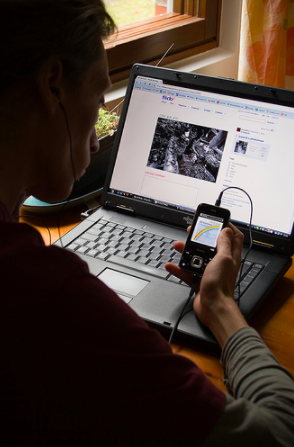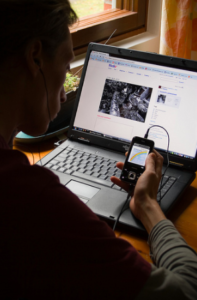
Listen to this post
 Yes, I’m a self-professed geek, but hacking and phishing and bugs – oh, my! Add endless IMs, emails and texts, and you’ve got potential for endless stress.
Yes, I’m a self-professed geek, but hacking and phishing and bugs – oh, my! Add endless IMs, emails and texts, and you’ve got potential for endless stress.
As much as I love technology, there are times when I really just want to unplug. Easier said than done, right? That’s why psychologist Larry Rosen’s book iDisorder caught my eye – a frank examination of how our attachment to technology is affecting mental health.
As someone who finds it fairly easy to juggle multiple activities, I was fascinated to learn that multitasking is a myth. After all, the cerebral cortex can only pay attention to one thing at a time. Rather than doing several things simultaneously, multitasking means rapidly switching attention from task to task. You get the illusion of doing many things at once and wind up not doing any of them as well as you could. The brain is overloaded and the mind, dangerously distracted.
Having been rear-ended last year by a young woman who was texting, I count myself lucky to have survived unscathed. Psychology professor David Strayer has said that a driver using a cell phone is every bit as impaired as a driver who’s legally drunk.
Younger generations find nothing odd about jumping from screen to screen, simultaneously listening to music, texting, watching TV, Tweeting and the like. Not surprisingly, studies of students who are heavy media users are at higher risk for depression and poor concentration, and show deficits in empathy and social skills.
Adults aren’t exempt from such perils. Even if you don’t perceive a problem, studies indicate that the neurological effects of simultaneous technology use contribute to stimuli overload – and that those effects last long after you’ve powered down.
Simply put, technology is changing our brains. So much information is now at our fingertips, we’ve come to rely on the Internet as a kind of externalized memory. Betsy Sparrow of Columbia University calls this the “Google Effect”: Can’t remember the name of the movie you saw last weekend or the book you read last month or the restaurant you visited a short while ago? No problem! Just Google it! This in itself isn’t a bad thing. But it is causing memory function to decline.
So how can we reap the benefits of the Internet and keep our brains healthy and our interpersonal skills sharp? Here are some suggestions:
- Stop multitasking! Prioritize your work and focus on one thing at a time. Allocate designated times for e-mail – before work, mid-morning, mid-afternoon, end of day – to minimize constant interruptions. The rest of the time, give your full attention to the task at hand.
- Build technology breaks into your day , every day. Every 60 or 90 minutes, get up and take a 5 to 10 minute stretch. Better yet, unplug one day a week. Your brain will thank you.
- Limit time on social networks. Check in at established times for a set number of minutes and stick to the plan. When one of my clients chose to give herself two 15 minute Facebook breaks each day, Facebook became fun again, not another relentless “obligation.”
- Look at nature (pictures count). Scientists have found that taking a nature break can decrease stress and increase the brain’s ability to process information. Pay attention to what your senses enjoy most. I particularly love the smell and sound of the ocean.
- Learn something new – a language, for instance, or how to play a musical instrument.
- Practice yoga or tai chi.
- Meditate. I’ve saved the most important for last and can’t emphasize enough how important meditation is to developing self-awareness. Also called metacognition, this practice gives us the perspective we need to witness and ultimately tame our monkey-mind so that we can powerfully show up in the present. If you’re still unsure of meditation’s ability to affect your heart, brain or creativity, check out this entertaining TED Talk by Andy Puddicome. Meditation comes in many flavors.When you begin, finding the type of practice that might work best for you sometimes requires skilled guidance.
When we walk away from all of our devices and unplug, we have the opportunity – and the joy – of being deeply and richly present with ourselves and the world.
Image by Jari Schroderus, via Flickr